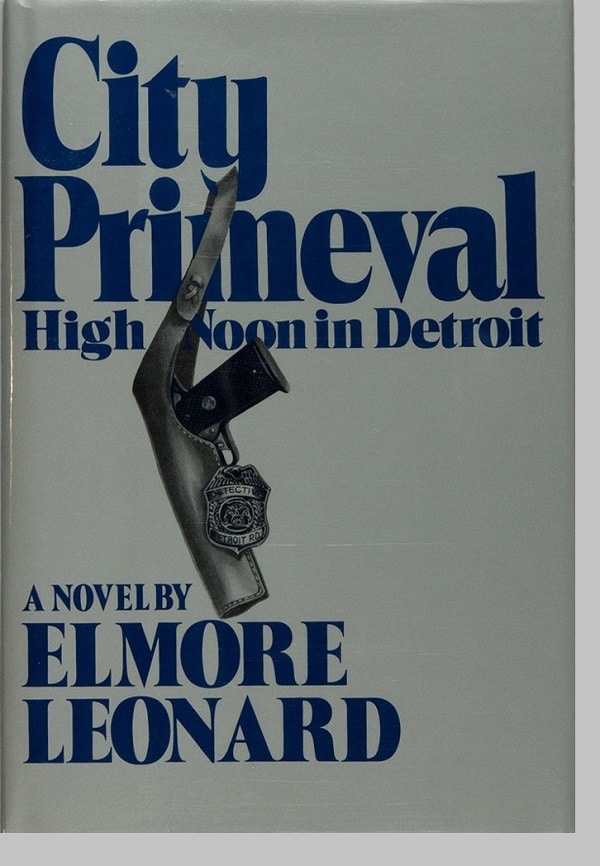I can’t think of another Elmore Leonard book that has a subtitle like his 1980 City Primeval: High Noon in Detroit.
That’s also a pretty portentous, if not to say pretentious, title. Usually, Elmore’s titles are snappier, such as Get Shorty or Rum Punch, or simply a single word, such as Hombre or Stick.
And it seems to promise an almost medieval morality tale, a western, and with two gunslingers facing each other in the final pages.
And that’s what Leonard delivers — sort of. He was, after all, Elmore Leonard.
The sociopath and the cop
City Primeval is also unusual inasmuch as it focuses on a cop, 36-year-old Acting Lt. Raymond Cruz of the Detroit Police Homicide Section. For the most part, cops tend to be bit players in a Leonard novel, often comically inept or racist or loudmouth foils to the snappy-talking, self-contained central character.
That central character usually lives very close to the border of illegality, if not on the other side of it. But, even when this guy is a criminal, he tends to be a decent criminal.
Leonard specialized in decent criminals and ex-criminals and near-criminals. And in the sociopaths with whom they cross paths or find themselves working.
City Primeval has its sociopath, the 34-year-old Clement Mansell from Lawton, Texas, and he’s nearly a big a presence in the novel as Cruz.
Indeed, the story develops into a mano a mano thing between Cruz and Clement. Part of the reason is that, three years earlier, Clement was nailed dead to rights with two codefendants for a triple murder but walked, smilingly past the cops in the courtroom, because of a Mickey Mouse technicality.
Now, he’s being interrogated for the murder of a county judge whom everyone — but everyone — wished dead and of the young woman who was with him. It doesn’t give away anything not revealed in the novel’s first few pages to say that Clement did the deed. But, clever that he is, Clement knows that Cruz and the other cops have the earlier murders on their minds.
“What’s bothering you, three years ago you guys blew it. You had me convicted on a triple, air-tight with witnesses, and I walked. That’s been bothering the shit out of you. So now you’re gonna try and get me on this one to make up for it. See, now it does get personal. Right? You don’t care who hit the judge, you just want me. Am I right or wrong?
Raymond took his time. He said, “See, we’re finding out where we stand.”
“Not all in De-troit”
The two men are alone in the squad room, and Clement is doing everything he can to harass and provoke Cruz. At the end of a long, rambling, self-serving monologue, the criminal says:
“You got numbers, all these chicken-fat dicks that’d rather play the game than work; but I got the law to protect me and all I got to do is keep my mouth shut, don’t associate with stupid people and there’s no way in hell you’re gonna lay this one on me…or any of the others.”
He’s just taunting Cruz, but the lieutenant plays along.
“You know how many people I’ve killed?”
“Five,” Raymond said.
“Nine,” Clement said.
“In Detroit?”
“Not all in De-troit. One in Oklahoma, one in Kansas.”

This nod-nod, wink-wink from Clement leads Cruz to ask if his cat-and-mouse game of committing crime and eluding arrest is simply a version of the kid’s cops and robbers.
“But what it comes down to,” Raymond said, “what it’s all about, I mean, is just you and me, huh?”
“That’s it, partner.”
And that’s the rest of the book.
“You know I’m not kidding”
Clement sees Cruz as a partner in this game, and Cruz doesn’t reject that idea, exactly. He’s doing his job not just for the pleasure of nailing a guy like Clement — a guy who kills people, often without reason, and enjoys it — but he is honest enough with himself to recognize that such an arrest would be personally gratifying.
Clement knows Cruz is hamstrung by the law, and he needles the cop about this.
“Be something we had us a shooting match, wouldn’t it?…I was thinking out on the street…Like when you least expect.”
“I’ll ask my inspector,” Raymond said, “see if it’s okay.”
“You won’t do nothing of the kind,” Clement said, “’cause you know I’m not kidding.”
A short while later, Clement does take several potshots at Cruz with a rifle, so, even though he’s talking a showdown, he’s not playing fair. He knows that Cruz’s job requires him to play fair, so the killer is just toying with the cop.
Until the novel’s end. And the two face each other.
Antipathy and similarity
City Primeval is one of Leonard’s best novels, in part because it’s plotted around the antipathy of its two main characters for each other and their recognition of their similarities — and their odd attraction for each other as savvy fellow professionals.
Much more, though, it’s because Clement is such as flamboyantly devious and violent character and because Cruz, while thoughtful and methodical, is all the time pulsing with contained and focused emotions.
Both men bet on themselves and on what they know of each other. One loses.
…
Patrick T. Reardon
3.30.21
Written by : Patrick T. Reardon
For more than three decades Patrick T. Reardon was an urban affairs writer, a feature writer, a columnist, and an editor for the Chicago Tribune. In 2000 he was one of a team of 50 staff members who won a Pulitzer Prize for explanatory reporting. Now a freelance writer and poet, he has contributed chapters to several books and is the author of Faith Stripped to Its Essence. His website is https://patricktreardon.com/.
